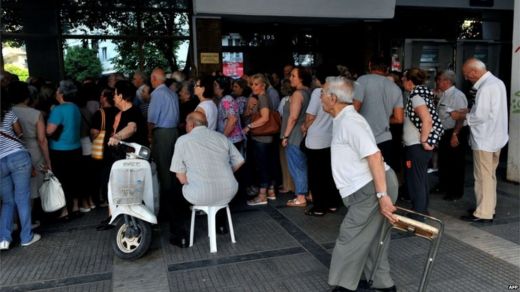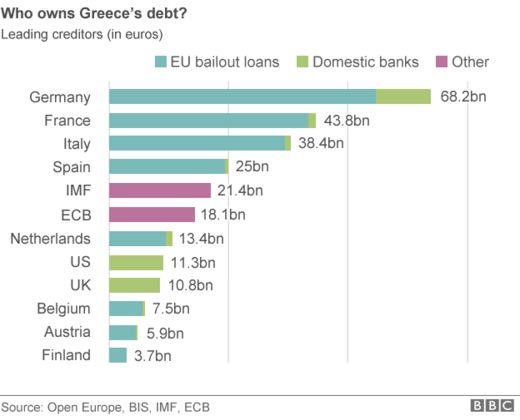 |
| Pensioners queue for withdrawals from cash machines |
Greek debt crisis: Major rallies ahead of referendum, govt calls for strong "No"
Mr Tsipras has said that a strong "No" vote will help lead to a "better agreement" with creditors.
Lenders' proposals: Key sticking points
VAT (sales tax): Alexis Tsipras accepts a new three-tier system, but wants to keep 30% discount on the Greek islands' VAT rates. Lenders want the islands' discounts scrapped
Pensions: Ekas top-up grant for some 200,000 poorer pensioners will be phased out by 2020 - as demanded by lenders. But Mr Tsipras says no to immediate Ekas cut for the wealthiest 20% of Ekas recipients
Defence: Mr Tsipras says reduce ceiling for military spending by €200m in 2016 and €400m in 2017. Lenders call for €400m reduction - no mention of €200m
Source: European Commission document, 26 Jun 15 (pdf) Greek debt jargon explained
Ahead of referendum
Rival camps in Greece are set to hold major rallies in Athens ahead of Sunday's crucial referendum on international bailout terms. Prime Minister Alexis Tsipras is expected to address the rally for the "No" vote, opposing the terms.
EU leaders have warned that a "No" vote could see Greece leave the eurozone.
Greece's economy is already being squeezed after the country lost access to fresh funds. Banks have been shut and limits imposed on cash withdrawals.
Greece has been in deadlock with its creditors for months but only called the referendum last week to see that Greece citizens participate in deciding the future of the country in eurozone.
There has been no campaigning as such, but the supporters and opponents of the governing Syriza party have jostled for position. Both sides are now racing to reach voters before time runs out, with "Yes" and "No" posters vying for space.
A poll published in Ethnos newspaper on Friday showed the two sides evenly split, with the "Yes" vote at 44.8% and the "No" vote at 43.4%. But the same poll showed 74% in favour of staying in the euro, with just 15% choosing a return to a national currency.
The reaction in Germany
Most individuals in Germany express sympathy for the people of Greece but show impatience and irritation with its government.
More than one politician has remarked that Greece will cost Germany more money anyway - either in support if it crashes out of the eurozone or in further help if it stays in.
Human rights body the Council of Europe has already said the referendum would "fall short of international standards" if held as planned, citing the short notice given to voters and the lack of clarity in the question to be put to voters.
There have already been rival protests in recent days.
Greece government position
Mr Tsipras has said that a strong "No" vote will help lead to a "better agreement" with creditors.
"If the 'Yes' vote wins the banks will open with a deal, which will not be viable, but if that is the decision of the Greek people, either from fear or from pressure, or choice, we will respect it," he said.
"If the 'No' vote wins, and the 'No' is stronger, I assure you, the very next day I will be in Brussels and a deal will be signed."
But EU leaders have warned that a "No" vote on Sunday may see Greece forced from the eurozone, something Mr Tsipras says he does not want to happen.
"If the Greeks will vote 'No' the Greek position will be dramatically weakened," said EU Commission President Jean-Claude Juncker. "Even with a 'Yes' vote "we'll face difficult negotiations," he said.
And Jeroen Dijsselbloem - head of the Eurogroup of finance ministers - dismissed as "completely false" a claim by Greek Finance Minister Yanis Varoufakis that a deal would be reached very shortly after the referendum, allowing banks to reopen on Tuesday.
Mr Dijsselbloem said Athens had chosen a "very risky" path regardless of the outcome of the referendum, reports Reuters news agency.
Several European officials have complained in strong terms about Greece's abrupt decision to hold a referendum on the terms of a bailout offer that they say is no longer on the table.
Mr Tsipras's opponents in Greece have also said they believe he is making a mistake.
In a speech endorsing the "Yes" campaign on Thursday, former Greek Prime Minister Costas Karamanlis said the world would "consider a 'No' vote to be a withdrawal from the heart of Europe, the first step toward euro exit".
Some bank branches have reopened to allow pensioners a one-off weekly withdrawal of up to €120 ($130; £85), resulting in long queues. Withdrawals from cash machines are capped at €60 a day.
The Syriza government was elected on an anti-austerity platform. Mr Varoufakis described the programme offered by creditors as "a travesty, a comedy of errors".
The European Commission, the European Union's executive arm - one of the "troika" of creditors along with the International Monetary Fund and the European Central Bank - wants Athens to raise taxes and slash welfare spending to meet its debt obligations.
The IMF on Thursday said that Greece would need €50bn ($55bn; £36bn) over the next three years to stabilise its finances under the existing, disputed bailout plans.
The IMF reached its latest conclusions before talks between Greece and its creditors collapsed last weekend when the government called the referendum.
On Tuesday, the previous eurozone bailout expired, depriving Greece of access to billions of euros in funds, and Athens missed a €1.5bn repayment to the IMF.

